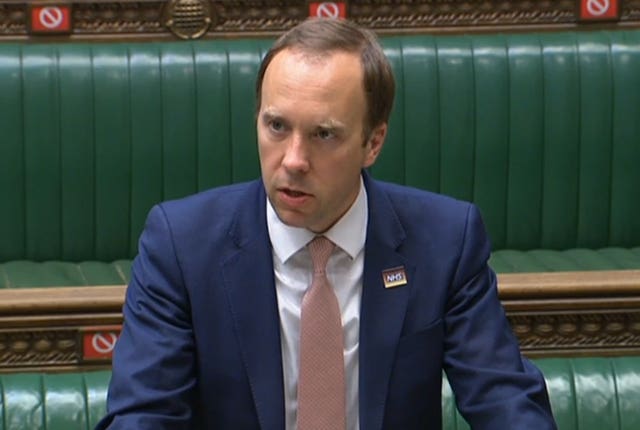NHS facing ‘unknowable’ level of demand, Health Secretary warns
Matt Hancock said the number of patients waiting for care is “far larger’ than official figures show.

Matt Hancock has warned the number of patients waiting for care is “far larger” than official figures show – with an “unknowable” level of pent-up demand.
The Health Secretary told MPs that 380,000 people have waited more than 12 months for care compared to 1,600 on the waiting list in the months leading up to the Covid-19 pandemic.
But he cautioned these statistics do not include the “returning demand” of people who held off seeking support in a bid to help the NHS weather the Covid crisis.
The NHS will need to operate at a “scale never seen before” across the whole of the UK to clear the backlog, Mr Hancock added.
Data from NHS England published last week showed 4.95 million people were waiting to start hospital treatment at the end of March – the highest number since records began in August 2007.
Mr Hancock’s remarks came during the sixth and final day of the Queen’s Speech debate, which saw Labour table an amendment in a bid to make the Government publish its internal review of its handling of the Covid-19 crisis.
It was defeated by 367 votes to 264, majority 103.
MPs later approved Prime Minister Boris Johnson’s programme for government over the coming months – also by 367 votes to 264, majority 103.
Speaking in the House of Commons, Mr Hancock said: “We now have 4.7 million people in England waiting for care and more in Scotland, Wales and Northern Ireland.
“Before the pandemic we had succeeded in getting the 12-month waiting list down from 18,700 in 2010 to just 1,600 in the months leading up to the pandemic.
“Now, 380,000 have waited more than a year for care.
“But these figures do not yet include the returning demand of those people who have a problem but have yet not come forward during the pandemic.
“They have been trying to reduce the burden on the NHS but are now rightly regaining the confidence to approach the NHS.
“So the real waiting list is far larger than these figures, and as people re-present with problems they might not have wanted to bother the NHS with this past year, we will see the waiting list go up.
“We know during the pandemic 6.9 million fewer patients were added to the waiting list for diagnosis and treatment.
“The scale of this pent-up demand that will come forward is unknowable but to give the House a sense of the scale of the challenge, since the start of the pandemic the NHS performed 70% fewer electives than in a normal year – and some of these will return, some will have been resolved without the need for hospital treatment.
“We don’t yet know how many will present themselves and add to the waiting lists, but what we do know is the NHS needs to operate at a scale never seen before across the whole United Kingdom to clear the backlog.”

Mr Hancock said £7 billion of further funding for healthcare services has been committed, including £1 billion to address pandemic-related backlogs.
He went on: “We’re also helping the NHS to recover medical training and today I can confirm to the House an additional £30 million for post-graduate medical training.
“The formula for beating this backlog is looking closely at the demand as we emerge from the pandemic, putting the right resources in to meet this demand and putting in place an ambitious programme of improvement in the NHS.”
For Labour, shadow health secretary Jon Ashworth earlier asked: “Where is the plan in this Queen’s Speech to bring down the rocketing waiting lists for treatment and surgery?
“The NHS was forced into this unprecedented position because we went into the crisis on the back of 10 years of Tory underfunding and cutbacks.
“We went into this crisis on the back of a 6% reduction in bed numbers between 2010 and 2019. That’s why at the beginning of 2020 when we debated the last gracious address 4.5 million people were on the waiting list for treatment.
“The target for 92% of patients to begin treatment within 18 weeks of referral from their GP had not been met for five years, but we need a resourced plan now because the queues are set to lengthen further.”





